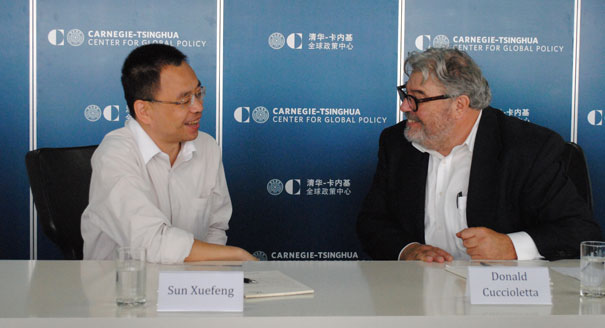Registration
You will receive an email confirming your registration.
Four months after the historic meeting between Chinese President Xi Jinping and U.S. President Barack Obama at the Sunnylands Estate, the direction of Obama’s East Asia policy remains unclear. The U.S. government shutdown and Obama’s resulting withdrawal from the 2013 Asia-Pacific Economic Cooperation (APEC) Forum has prompted questions about U.S. commitment to the Asia-Pacific.
Carnegie-Tsinghua’s Sun Xuefeng hosted a roundtable discussion with Donald Cuccioletta of the University of Quebec and Horace Campbell of Syracuse University on the future of U.S. policy toward East Asia.
Trouble on the U.S. Domestic Front
Cuccioletta stated that Obama had previously promised to attend every annual APEC forum. His recent withdrawal demonstrates the influence of U.S. domestic politics on U.S. foreign policy.
- Domestic Politics: Cuccioletta explained that Obama withdrew from the APEC forum because of the turbulent domestic political situation, not out of a lack of commitment to the nations of APEC. He added that Obama lacked the political leverage to leave Washington when the U.S. Congress had not yet reached an agreement to end the government shutdown. Obama’s withdrawal from the APEC forum did not signify a coming change in his East Asia policy, he concluded.
- Government Agency Divide: Obama’s attempt to shift the direction of U.S. foreign policy has been met with opposition from other government agencies, such as the departments of state and defense, Cucchioletta said. He explained that many people in these departments still hold Cold War approaches toward foreign policy. Campbell added that the Pentagon had begun planning for a conflict with China through the AirSea Battle (ASB) project without the expressed direction from Obama.
- Neoconservatives Resistance: Cuccioletta stated that the neoconservative ideology of former U.S. president George W. Bush persists in media outlets, think tanks, and government agencies. Campbell agreed, but added that Obama’s reprimand of U.S. General Stanley McChrystal, the killing of Osama bin Laden, and Obama’s 2012 reelection is evidence of neoconservatism’s waning influence.
Signs of Changing U.S. Policy in Asia
- Policy Transition Takes Time: Cuccioletta explained that there are multiple entities involved in the making and executing of U.S. foreign policy. As a result, Obama cannot make any quick changes. However, he added, Obama has begun to steer the United States away from the Cold War superpower mentality and toward a more Wilsonian type of diplomacy that is characterized by soft power and multilateralism.
- Evidence of Policy Shift: Campbell cited Obama’s careful handling of the Syrian crisis and his hesitance to avoid an overt conflict with Iran as evidence of a new type of diplomacy by the United States. Cuccioletta agreed, but noted that increased military ties between the United States and nations such as Japan, Australia, and the Philippines remind the international community of the U.S. dedication to maintaining its global hegemony.
- U.S.-China Cooperation Continues: Campbell explained that there was a tacit agreement between the two powers to prevent another “capitalist crisis” akin to the Great Depression. One example is China’s continued purchases of U.S. Treasury bills even after the U.S. Federal Reserve utilized quantitative easing to inflate the U.S. dollar. He argued that this type of cooperation was necessary in order to prevent a crash that would cripple the global economy.
Remaining Hurdles
- Another Capitalist Crisis: Campbell suggested that the financial crisis of the 1930s is a reminder of the possible dangers of economic trouble when coupled with nationalism. He stated that the United States had to pursue a foreign policy that recognized the possibility of another global financial crisis and the destabilization it would bring.
- U.S.-Japan Ties: Cuccioletta added that the continued U.S. military ties to Japan and permission for the United States to construct a base for surveillance drones in Japan are possible areas of conflict between China and the United States. Campbell responded the United States could use their allied status and employ diplomacy to prevent a conflict between Japan and China.
- Other Regional Alliances: Cuccioletta listed U.S. military exports to South Korea, arms sales to Taiwan, and transfer of nuclear technology to India as potential hurdles to changing the U.S. policy toward China. He explained that though the United States has begun shifting toward soft diplomacy, it will not entirely abandon its allies.
